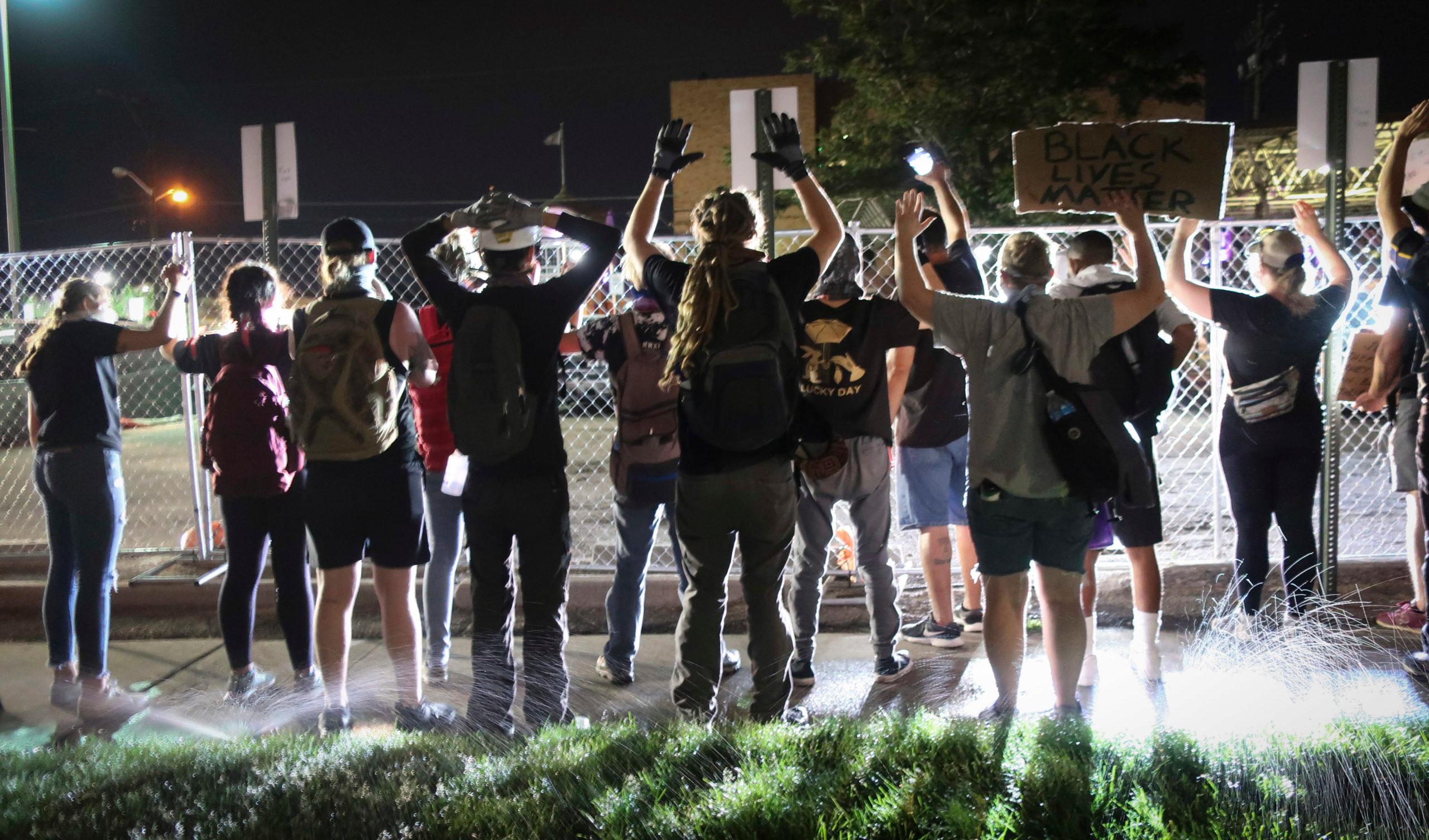Just before the thousands of protesters left Cheesman Park the evening of June 5, they chanted "We are one," and "We are love." But as they walked down 12th Avenue back toward the state Capitol, the chanting shifted depending on where one was in the crowd. "Hey hey, ho ho, these racist cops have got to go," was one variant.
Then, as the group reached North Clarkson Street, the division was laid bare. Some continued west, back to the Capitol steps. Others, led by the Party for Socialism and Liberation, chanted "turn right for justice," and headed north toward the Denver Police Department's District Six building a few blocks away.
They arrived at the station, which was surrounded by chain-link fencing and dozens of police officers decked out in riot gear. Dozens of protesters approached the fence just before 10:30 p.m. with their hands in the air, chanting "I can't breathe." Speakers addressed the crowd from the back of a truck that had a sign reading, "JAIL ALL KILLER COPS."
"The cops are not our friends," one speaker said.
"Stop walking with them," someone yelled back.
Just moments later, the target of that crack approached the truck. Neil Yarbrough, a 25-year-old Black Denver man, was photographed walking with Denver Police Chief Paul Pazen earlier in the week. He'd also led some of the more inclusive chants earlier in the evening and led the march back to the Capitol.
"Let me speak," Yarbrough shouted after he threw a water bottle in the air, leading to chants of "peaceful protest."
Eventually, Yarbrough got the megaphone and told the crowd they should work with the police.
"If y'all haven't noticed, since I walked with the cops, nobody's gotten pepper sprayed," he said.
The protests had indeed become more peaceful by that Friday. A week before, police shot tear gas and pepper balls at protesters for four straight nights.
Police response has shifted over the 12 days since Denverites first took to the streets to protest police brutality and the death of George Floyd in Minneapolis. But so too have the issues that protesters and march leaders have emphasized in that time, culminating in the crowd's split on Friday night. A more inclusive, positive message at many protests coincided with them growing in size. But seasoned activists and other protesters say less confrontational tactics could result in less pressure on political leaders and police departments to institute the change they're demanding.
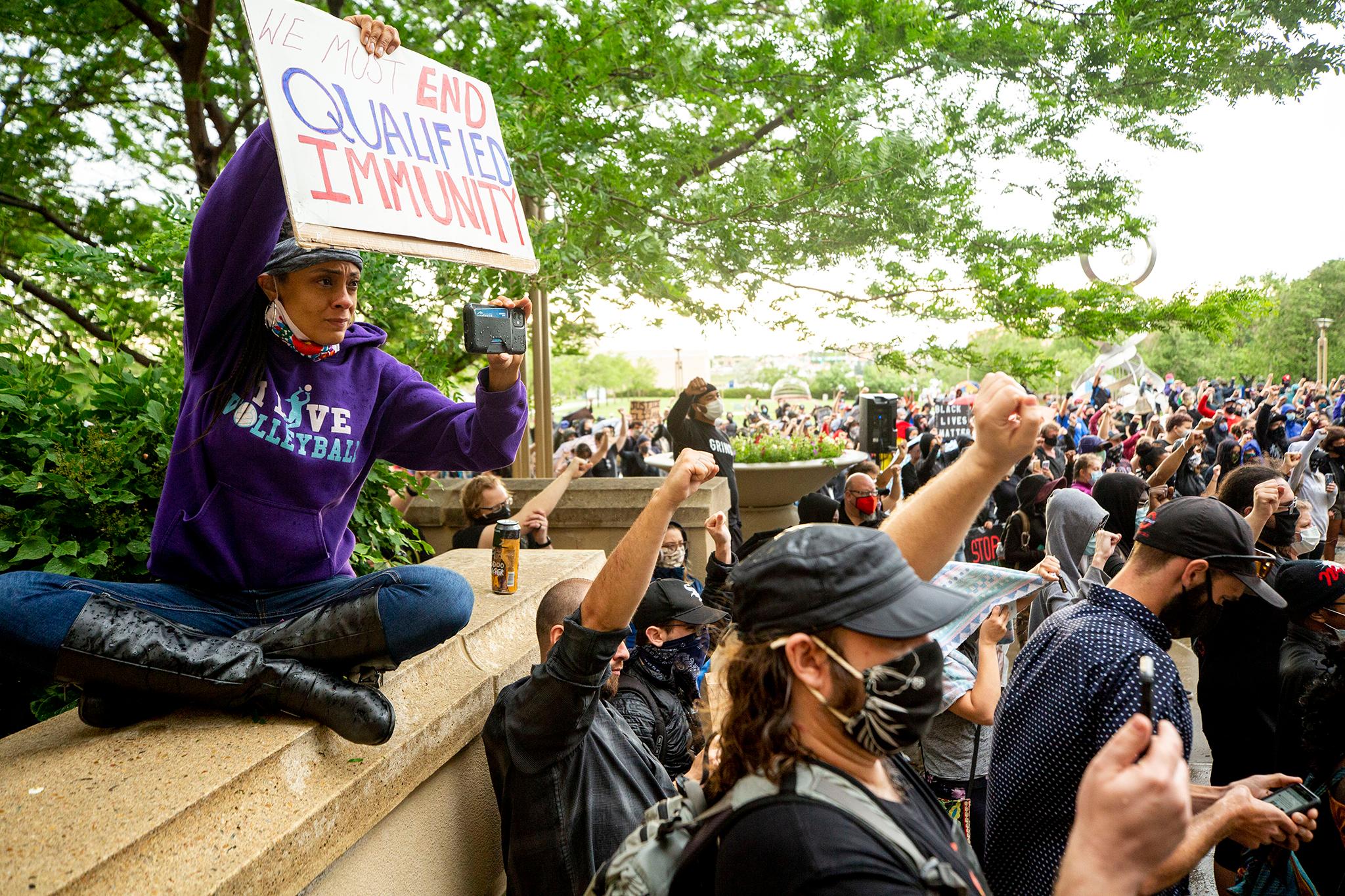
One of those long-time activists is Elisabeth Epps, a justice reform advocate and self-described abolitionist with the Colorado Freedom Fund. The violence of the first few nights of protest caught her off guard, she said. Police shot her in the leg and face, she said. But, a week later, she said it was a productive demonstration.
"At least that night was organic," she recalled. "And I was with people who I felt that we had common motives. We did not want or invite any of the police terror that we experienced."
Epps is advocating for a sweeping police reform bill currently being debated at the state Capitol (it passed the Senate Tuesday morning). It disheartened her when just days later, the mood on the streets shifted significantly. On Monday, June 1, Denver Police Chief Paul Pazen marched arm-in-arm with protesters including Yarbrough.
"We need to bring the temperature down," Pazen said then.
That march ushered in a new era of protests that lasted through much of the week.
They became less confrontational and started to emphasize unity and peace -- and they grew in size, too. On Wednesday, Yarbrough and a few others set up a Twitter feed and Instagram account for "We Are Love Denver," a loosely organized group.
"I was out there every day and every night," Yarbrough said of the early, more violent protests. "And there was nobody out there leading. And so we decided to step up, and we decided to lead."
Yarbrough said he'd never heard of the local Black Lives Matter chapter, which has existed for years and has organized at least one protest so far. That group did not respond to a request for comment but in a recent Facebook post said it was focusing on pending legislation at the Capitol.
"We're out here in other community spaces helping Black people and dismantling oppressive systems," the post said.
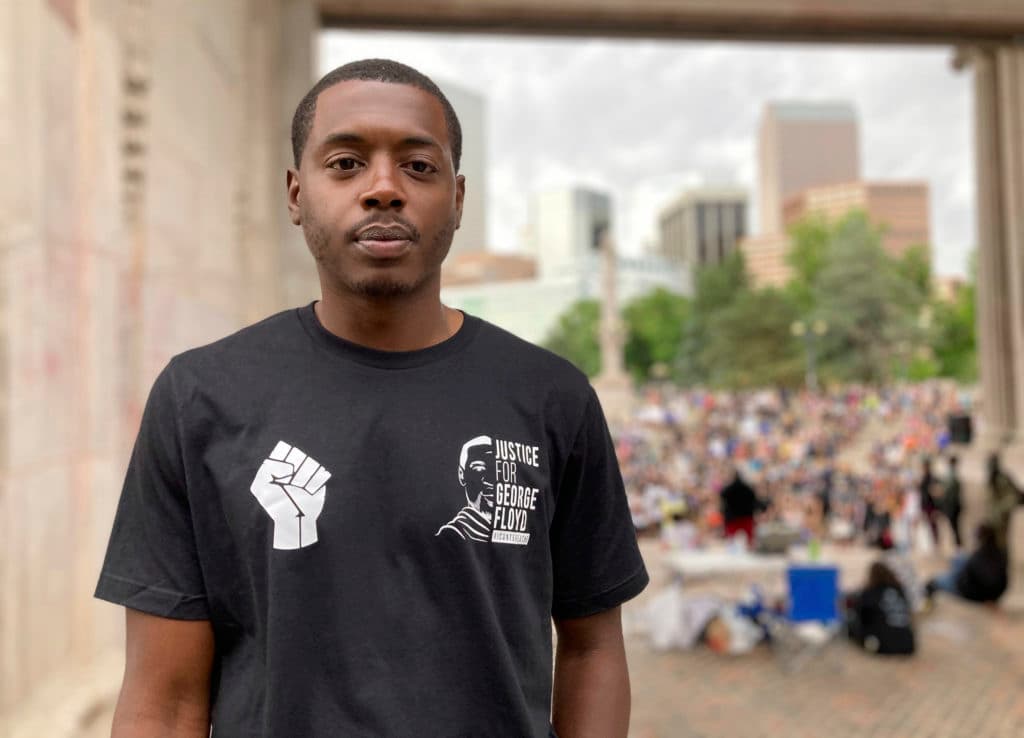
As the name suggests, "We Are Love Denver" emphasizes inclusion and positivity over confrontation.
"We need everybody on board. Everybody needs to know what injustice is. Everybody needs to be aware of what racism is. And only then, we'll get change," Yarbrough said.
Yarbrough said he had a difficult childhood growing up in Houston's Fifth Ward, a historically Black neighborhood split by Interstate 10 in the 1960s. The construction of the highway started a long decline, the Houston Chronicle reported, but it's seeing more development in recent years. He said he moved to Denver four years ago and is a banker and real estate agent.
Yarbrough holds beliefs similar to more aggressive protesters, like that Denver should reallocate money from the police department to minority communities and police should be required to intervene when another officer is committing a crime. But he said he emphasizes inclusion and positivity because he's had friends die and wants his younger siblings to grow up in a better world.
"They don't know the stuff that we've had to go through," he said. "I don't want to expose them to that. I want to expose them to love. You know what I mean? A different narrative. That's what I believe in."
Yarbrough has become the face of the group, describing himself as a "de facto leader." He MC'd an open mic on the Capitol steps last Friday, led chants at Cheesman Park that evening and marched next to Denver Broncos star linebacker Von Miller on Saturday. But he couldn't say how many people were at the core of We Are Love Denver.
"It's a movement," he said. "It's not just a couple of people or a few leaders. There are thousands of us."
That movement has started to wobble, though.
Speeches at the open mic that constituted much of last Friday's event on the west Capitol steps and at Cheesman Park generally stuck to racial issues, but at times they extended to religion in schools and marijuana in health care. At one point, Yarbrough led chants and asked the crowd which song the band at the protest, the Brothers of Brass, should play next.
Alex Bunting was watching with a friend, next to the stone columns of the Cheesman Park pavilion. He said there was just one song for this moment: Public Enemy's "Fight The Power."
"Let's hear something that incites people to make a change," said Bunting, a 28-year-old small-business owner who is Black.
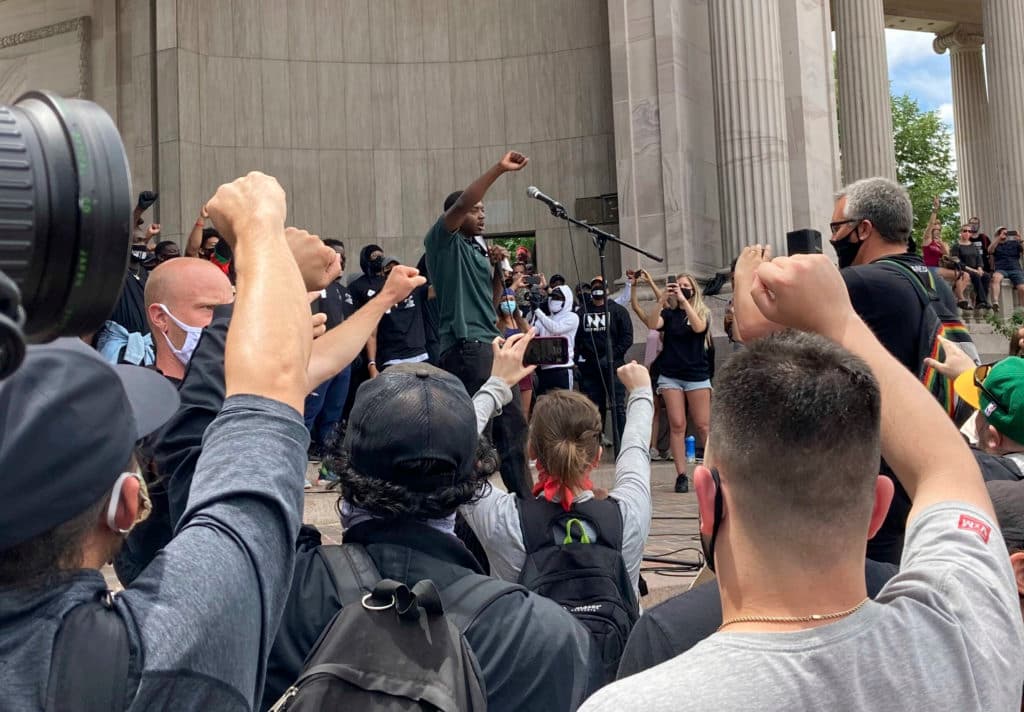
The protests had lost their meaning as their tone shifted, in Bunting's estimation. "It's all over the place," he said. "Everyone has different motives."
Criticism of We Are Love Denver soon spread, from anonymous online forums to Twitter, where Denver Public Schools Board member Tay Anderson distanced himself from the group.
Flyers taped to utility poles near the state Capitol also appeared over the weekend, criticizing Yarbrough for marching with Denver Police Chief Pazen, a pattern of Black women not being allowed to speak at his events (which Yarbrough publicly apologized for a day later), and alleging Denver Mayor Michael Hancock's office hired Yarbrough as a counterinsurgency tactic.
Yarbrough denied that last claim outright, and said no one from his group has communicated with Mayor Hancock's office or the city, short of applying for a permit to use Civic Center Park. (A permit is needed to get power for a sound system, he said.) The group's other resources have come from donations, he said, and are mostly in-kind for audio and video services.
A spokesman for the mayor's office said it has had no direct contact with the group.
"While the Mayor's Office has not worked directly with Neil Yarbrough or the We Are Love Denver group, community engagement staff have done outreach to and met with other individuals and organizers to hear their concerns and thoughts around policing in Denver," said a statement from the mayor's office. "During this national conversation, this outreach is critical to making the changes needed to address the systemic challenges in our criminal justice system."
Hancock did speak to protesters at Civic Center Park last Wednesday, an event that critics now point to as proof that the mayor's office had co-opted We Are Love Denver. Yarbrough said some people now affiliated with We Are Love Denver were there, but they didn't organize the event. "We weren't even officially a group yet," he said.
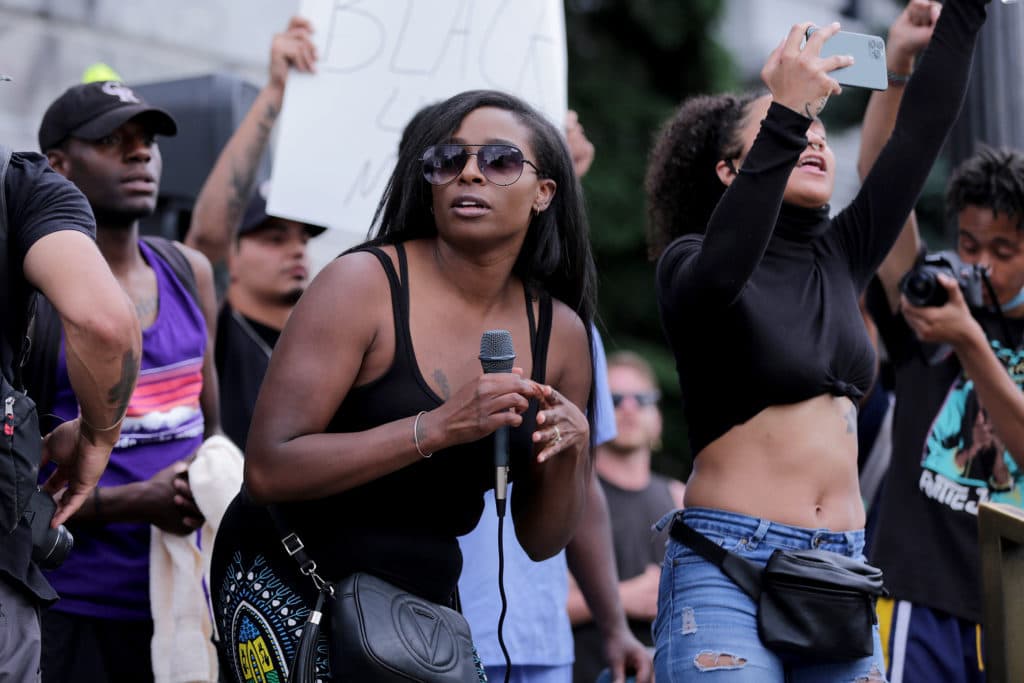
At least one other person affiliated with We Are Love Denver, Dazha Mannani, a Black 34-year-old mother of three, said she's received a barrage of criticism too. Initially, she said, she was thrilled with the response the group got last week. She fell into the group because she was looking for like-minded people.
"We all just met. I don't know them from a can of paint. I can't even say where Neil works," she said.
She gave a full-throated defense of We Are Love Denver on Saturday, which was posted to the group's Instagram page. She said she can't bring herself to read the comments, which are mostly critical, but has gotten the gist from friends.
"I feel like I wasted my time, my energy, you know, trying to just stand up for what's right," she said. "Now I just wish I never went down there. That's how I feel in my heart."
After this story was first published, Mannani called Denverite to clarify that she doesn't think protesting was a wasted effort."I just wish I wouldn've kept my energy and passion in the streets, marching with the people, fighting for justice," she said.
The rest of We Are Love Denver is going quiet too, for a little while at least.
Their last event was Saturday, and Yarbrough said the next major one wouldn't be until this coming Sunday. He said he's going to take a step back in the meantime.
Epps said it's clear Yarbrough has a lot to learn. Black women's voices need to be at the front of the movement, she said -- a point that Yarbrough said he now appreciates in a new way. And while she doesn't think he's a plant, she's afraid the police department, which did not respond to a request for comment for this story, is using him.
"They recognize, well, 'If we've got someone who can get folks' attention and we can help him get a permit and have some perceived power ... if he's able to keep people in line, well, that's certainly less of a lawsuit for us than rubber bullets,'" she said.
Yarbrough said it was his idea to approach Chief Pazen to march with protesters. He thought it was a "step in the right direction," because he wants to build a relationship between protesters and the department.
That access is a huge chance to apply pressure to the department, Epps said. And the following Yarbrough finds himself with now is also a huge opportunity that she wants to see him put into action.
"We have a moment," she said. "And they're taking up so much oxygen, taking up so much space that they're both missing the opportunity, but they're derailing it for those of us who have a point and have an ask and have an ask we can make of the crowd."
Other protest groups, like the Party for Socialism and Liberation, are far more direct with their demands. The group did not respond to multiple requests for comments about its future plans. But PSL member Pedro, who declined to give his last name, told Denverite reporter Esteban Hernandez on Sunday that DPD's recently announced policy changes resulted from the "power of protest" in the city.
"They're scrambling to see what they can do to appease protesters," Pedro said. "Banning a chokehold, that doesn't mean that's gonna stop them from doing the chokehold."
PSL won't be happy, Pedro said, until the police are abolished altogether.

